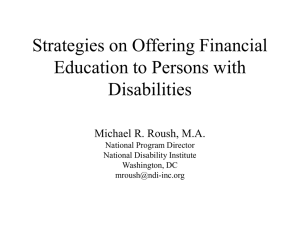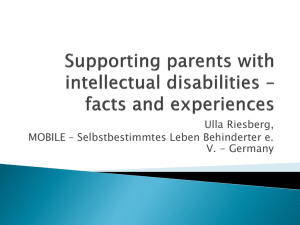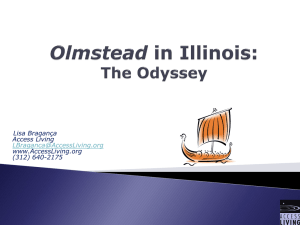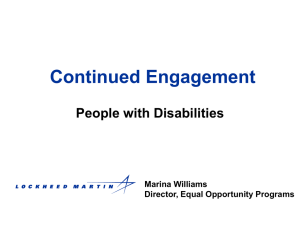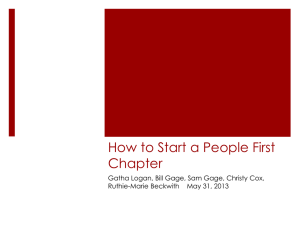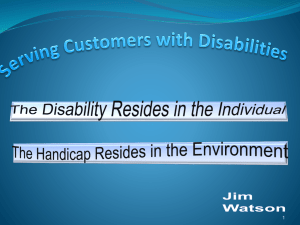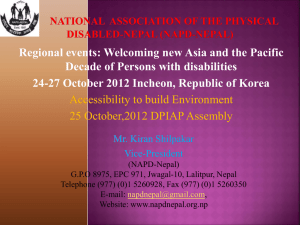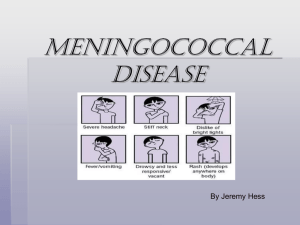Ågrenska
advertisement
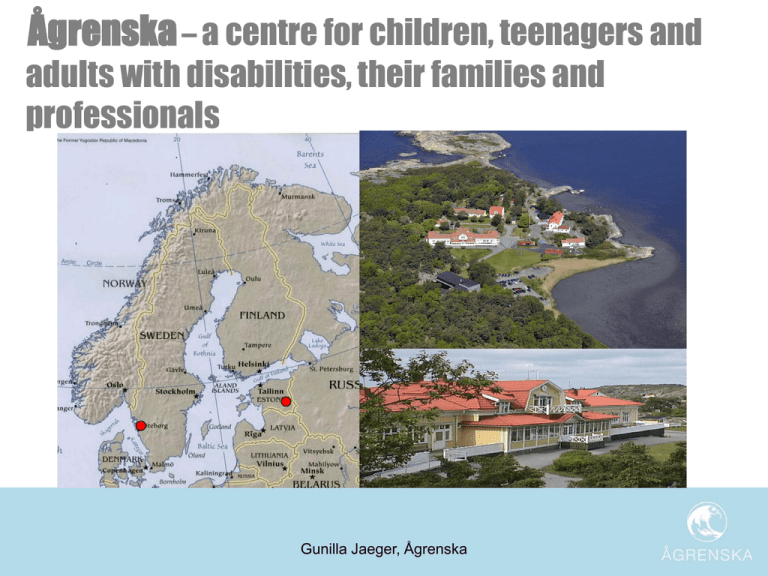
Ågrenska – a centre for children, teenagers and adults with disabilities, their families and professionals Gunilla Jaeger, Ågrenska Ågrenska QuickTime™ TIFF are needed (Uncompressed) toand seeathis decompressor picture. Ågrenska All our programs have been planned and are carried out in cooperation with • representatives from authorities • parental organisations /organisations for people with disabilities Our programs – holistic perspective • Family program – focus on rare diseases • Adult program – focus on rare diseases • Respite care including summer camps - all kinds of disabilities • Staff with disabilities – day centre, adapted work • • • • • Personal assistance ADHD consultant Courses for professionals Conferences Projects/development Why staff with disabilities? Ågrenska´s vision includes to contribute to creating possibilities for an optimal life for people with disabilities - a holistic approach • Society level – influence through information/knowledge dissemination • Individual level – a good job is part of a good life Ågrenska – inclusion at work Formal framework Practical work Formal framework Daily occupation/day centre responsibility of city council Act on Support and Service & Social Insurance Act Formal framework Ordinary employment – part of salary financed by state Public Employment Service Extensive legislation 1994 Act on Support and Services for Certain Persons with Functional Impairments Ten rights day centre/daily occupation – one of these rights Act on Support and Services Comprises support to people with severe disabilities Oct 2012: almost 69 000 people ~ 0,75 % 32 000 – daily occupation/day centre (10 000 – respite care) City councils/municipalities are responsilble for these services Formal framework Attend daily occupation – not employed, state ”pension” Within the public insurance system Can be arranged in different ways • Arranged by the municipalities themselves • The municipalities buy from other providers – Ågrenska one of those providers Criteria to meet - Approval from authorities to be permitted to run Public procurements Day centre Three people attend this service at Ågrenska Although they are not formally employed they and we regard it as their job In everyday working life they are part of the Ågrenska staff Ordinary employment - Wage subsidy • Ordinary employment – the employer pays salary, taxes, insurance fees, social fees etc. • The employer gets a state wage subsidy from the Public Employment Service Ordinary employment - Wage subsidy • The level of the subsidy depends on the salary costs and the working capacity/ability of the person • The employer can also get a montly ”supervisor subsidy”, almost always needed to some extent Ordinary employment - Wage subsidy • Renegotiated every four years – but regarded as permanent • The level of the subsidy can be changed according to the development of the person How to achieve inclusion? Basic values in the organisation • Respect everybody´s equal value • Everybody has the right to participation in society, a good life • Focus on possibilities - Everybody can contribute • We can make a difference To achieve inclusion - Ågrenska Extra ordinarily advantageous situation: • Met people with disabilities for 25 years in our everyday work • Target groups/guests are people with all kinds of disabilities • Having work mates with disabilities comes natural for us To achieve inclusion • Create possibilities for people with disabilities to get a job, is possible in many areas • Many employers´ contribution is important Ågrenska´s staff with disabilities • Ten people with disabilities work daily at Ågrenska • 65 - 90% wage subsidy • One fulltime employed boss/supervisor (~ 25% boss ordinarily) Ågrenska´s staff with disabilities Target groups of today are people with: Intellectual disabilities, 5 Neuropsychiatric, 4 Motor, 1 Ågrenska´s staff with disabilities • All tasks are adapted to the individual´s possibilities and needs, creating possibilities to succeed is essential • Meaningful and age relevant tasks, neccessary and important • Everyone participates in our social context, according to their own wishes e.g. is invited and urged to take part in events for the staff, like meetings, study visits, trips, parties, after work Ågrenska´s staff with disabilities Tasks within the Ågrenska service and support sector, e.g kitchen, cleaning, gardening, care taking, telephone switchboard, mail order service Tasks – telephone switchboard answering all incoming calls, switching to the right person, distributing incoming mail into everybody´s post box, handling franking machine document destruction Tasks - kitchen organising and carrying out dishwashing, putting into cupboards, cleaning tables, making sallad, coffee Tasks - gardening lawn mowing, cutting bushes, planting, burning lumber, branches, leaves Tasks – caretaking painting, car and boat washing arrange furniture for different occasions outdoor arrangements/constructions for events Tasks – caretaking shovelling the snow away chopping firewood Adaptions for people with intellectual and neuropsychiatric disabilities Structured days – routines: short morning meeting – info about the tasks, individually adapted written instructions at the workingplace or a small pocket paper slip Adaptions for people with intellectual and neuropsychiatric disabilities A physically facilitating environment, clear, logic, easy to understand and remember every activity has its own place Adaptions for people with intellectual and neuropsychiatric disabilities Some people like monotonous tasks, others want a lot of change – like all of us! Adaptions - inclusion Routines make it possible for people with disabilities to perform ordinary, necessary tasks otherwise performed by someone else Adaptions - inclusion Working together facilitates social relations, essential for a good life How to facilitate communication intellectual and neuropsychiatric disabilities? • Use short, simple, clear instructions • One separate instruction at a time • No ambiguous words or expressions - some people understand literally How to facilitate communication – neuropsychiatric disabilities? Esp for neuropsychiatric problems: • Facts – straight to the point – no social euphemisms • Don´t rely on gestures and mimicry Other needs - arrangements Interviews with adults with different diagnoses - needs realistic choices long term thinking Other needs - arrangements Short stature working position frequently used objects within reach small stool to stand on avoid lifting heavy things Other needs - arrangements Vision problems extra light computer magnification program computer keyboard with big letters adjustable screen fastening device – (avoid leaning forward, bad working position, muscle problems) sunglasses Other needs - arrangements Hearing impairments no group instructions - surrounding noise no noisy environment, ear plugs disturbing noise is tiresome – achieves less Other needs - arrangements Unilateral problems eg from cerebral palsy, dysmelia, accidents Beware of the risk of getting strain injuries from over-using e.g the working arm Other needs - arrangements Fatigue flexible working hours sheltered place for rest during daytime (if tasks allow and if not working full time) The informed patient /individual - adapted, accessible and correct information about rare diseases Background an abundance of information on the internet of unknown quality makes it even more difficult for people with cognitive disabilities to get access to purposeful information The informed patient /individual - adapted, accessible and correct information about rare diseases Purpose enable people with cognitive disabilities make informed decisions concerning their lives The informed patient /individual - adapted, accessible and correct information about rare diseases Being realistic when choosing education/profession – also some parental responsibility to help guiding The informed patient /individual - adapted, accessible and correct information about rare diseases Methods rewrite texts of existing documentation into easily comprehensible texts in cooperation with representatives with the diagnoses and with medical experts The informed patient /individual - adapted, accessible and correct information about rare diseases Neurofibromatosis 22q11 deletion syndrome Klinefelter, Noonan, William syndromes www.agrenska.se To achieve inclusion- tips to employers • Investigate the formal aspects and rules taking social responsibility must be affordable for an employer • Do not idealise, be aware of and accept that it will require some effort and work To achieve inclusion- tips to employers • The staff needs to accept that people have different possibilities, people are alike and different, but we are all human beings with equal value and a right to participation in society and a good life To achieve inclusion- tips to employers • Equal value does not mean that everybody shall be treated in the same way, but with respect and according to their possibilities To achieve inclusion- tips to employers • Consider the possibility to employ more than one person with a disability Is there a special department with more suitable tasks? A supervisor/boss/contact person important To achieve inclusion- tips to employers • Get information, facts about the person, his/her diagnose • Get facts about the disability/diagnose and its consequences - in everyday life generally - in working life especially and in the specific workplace To achieve inclusion- tips to employers • How does the person him/herself describe his possibilities and limitations? • Consider together with the individual what kind of adaptations that will be necessary e. g. in physical environment, equipment and aids, in tasks • Decide together how and what to inform the other staff about To achieve inclusion- tips to employers • Realistic expectations and demands - not too high and not to low • Reasonable demands important, you cannot refer everything to the disability and be excused e.g. for not being on time To achieve inclusion- tips to employers • An employer network might be a good idea, to exchange experiences and support each other • Cooperation with schools for teen agers/young adults with disabilities
